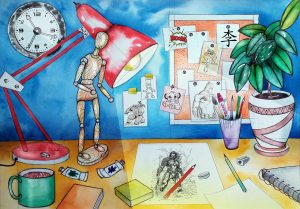When we realize we have the freedom to make decisions that shape our lives, including how we manage our time, it becomes easier to accept responsibility for our choices
BLOG
What do we do with an idea

Ida Protuger
RELATED
Does the flat organizational structure offer greater well-being?
We live in a time of intense change, where artificial intelligence and technological advancements are transforming the world overnight. This new reality is referred to as a BANI world, characterized as: Brittle Anxious Nonlinear Incomprehensible The BANI world...
Emotions and Leadership: Don’t suppress – learn how to express
Leaders are often burdened with negative emotions and unmet needs, just like everyone else. By mastering EI, particularly emotional regulation, leaders can promote a thriving, results-driven corporate culture.
Conversations with my clients gave me an idea to write something about our ideas.
I often hear them disappointed because they’ve had an idea (for a project, project development, goals, and generally in a professional context) but were afraid to share it, and it appears to be the wrong decision.
Often someone else on the team would voice the same idea, which turned out to be a good one, and the client regrets keeping it to themselves due to the fear of how it would be perceived.
So what do we do with our ideas?
We all have ideas and thoughts and often refrain from sharing them. This hesitation frequently occurs in a professional context, where we might not feel in a safe “family” environment. Usually, we wait to share our thoughts until we are confident they will be well received and not undermine us. This fear is understandable. We are born as individuals, but we cannot thrive alone. We are building relationships in order to thrive. Because of our social human beings’ nature, our belonging needs are strong, and acceptance by others matter greatly. Even more, if we need to establish or maintain credibility within that group, as in a professional setting.
However, if we often conform to others’ expectations, perpetually in the grips of “what will others say?” fear becomes a limiting factor in developing our ideas.
And on the contrary, if we build and strengthen our authenticity, and thus self-confidence, being aware of our strengths and limitations, we make informed decisions about when and how we will share our ideas.

No instrument measures the greatness of an idea, nor can we predict the perfect timing to share it as life unfolds while we plan it.
We live in a complex network of interactions and events, not within strictly controlled laboratory conditions.
Considering this, our relationship with our ideas should be nurturing rather than critical. We should give them the initial impulse to grow and transform instead of holding them down and regretting missed opportunities.
Failure as a part of success
Those who have written significant books and painted beautiful artworks have allowed the idea to come alive and transform into creation. Sometimes, conditions for recognition or affirmation of those ideas were supporting, and sometimes not.
Waiting for perfect conditions often becomes a limiting factor rather than an ally in idea growth. Nor does the lack of recognition mean that the idea was not good.
The symbol of Impressionism, Claude Monet’s world-renowned painting Impression, Sunrise, the author was not able to sell in his time. Art critics mocked it, and he lived in debt. He eventually gained recognition and financial success later in life, something many painters did not achieve and were recognized only after their deaths.

I am currently reading the book “Art of Joy” by an author who was unable to find interest in her book among publishers.
Her husband posthumously published it at his own expense, and it didn’t gain success.
Later after many years, it was “discovered” and is now translated into many languages, and it is a significant feminist art piece.
When our idea is born, we are the ones who will nurture and sustain it in life. An idea for a project, creation, business, book, company development, etc. Hence, that initial impulse is crucial – for it to be positive and nurturing.
I have a children’s book from my friend, who gave it to my son as a gift.
I read it to him, but at that time, it sounds to him abstract (which it is). However, I liked it and began to catch myself speaking to my clients, “Okay, that’s an idea, a vision; let it live, develop, and share it with someone from whom you expect constructive feedback.”
Furthermore, the fear that arises as we hear about achievements and successful projects is that ours would not be good enough. It is not a “perfect” idea that guarantees success. Hence, such a thing doesn’t exist. Some contexts or circumstances are in favor of the success of some ideas, and some are unfavorable.
Additionally, as a society, we need to change our attitude towards failures as part of success. Everyone could read about the successful launch of a car into space by the controversial Elon Musk, but not about his many unsuccessful attempts beforehand.
Transformation of an idea into a project
To transform an idea into an actual project, other important leadership skills are essential:
- Critical thinking helps us establish a stance concerning the information we receive, taking into account essential facts to aid us in making quality decisions regarding the future of our ideas.
- Active listening enables us to gain constructive feedback and a broader source of knowledge and facts to support our idea’s evolution.
- Effective communication – often, the realization of ideas doesn’t solely depend on us; it requires collaboration, and communicating the idea or its essential aspects is crucial for its completion.
- Positive adaptation to change – being flexible in the ever-changing conditions of our intensive times.

I share a few pages from the children’s book as an encouragement to all those with ideas so that they may foster a nurturing relationship with them. To give them the initial motivating impulse, to provide them with a chance to live and develop.
